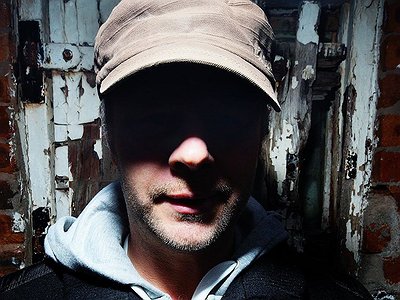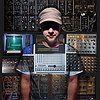Part 1.
Name: Andy Meecham
Nationality: English
Occupation: Producer, DJ, recording artist
Bands/Projects: The Emperor Machine / Chicken Lips/ Bizarre Inc/ Sir Drew/ Future Four/ Big Two Hundred/
Labels: Southern Fried Records / Phantasy Sound / DC Recordings
Musical Recommendations: YACHT on DFA Records ,The Two Bears on Southern Fried Records
When did you start writing/producing music - and what or who were your early passions and influences?
I started experimenting with sound, which is what I think I still do, from about the age of 8. This involved editing up songs and producing radio shows on an old tape recorder - one of those with the joint play/record buttons.
My father was technology mad. We had a constant stream of devices passing through our house. I remember listening to an early stereo recording from a reel to reel where everyone sat around to listen to an aeroplane moving from one speaker to an another. CB radios and the noises they produced, a constant stream of Hi-fi systems, all mixed together with a smattering of the BBC Radiophonic workshops and early TV sound effects all combined to fuse something together in my head - really good for what I do now, but has made me pretty unemployable in any other field.
What do you personally consider to be the incisive moments in your artistic work and/or career?
Meeting Dean Meredith (properly - we went to the same school but were DJ mix tape rivals) and working together at Blue Chip Studio. Not so much for what we produced or worked on during our time there but for the foundation it set for a 25 year working relationship.
Getting my first synth (thanks again Dad). Without that I could have been a superstar DJ (in my own head anyway) but for me the synth just opened up a world of opportunity. Synths inspire me in a way that nothing else does. Computer programmes are excellent tools but my inspiration comes from loosing myself in sounds in a hands-on way that I personally can't get from a laptop.
What are currently your main compositional- and production-challenges?
I now split my work between Llama Farm studio and working from pieces of equipment at home. After 25 years of having studios at home it's a bit of a shock and more of a change than I thought it would be. It's made me realise that inspiration comes from my surroundings as well as my equipment. That being said Llama Farm is an amazing place to work.
What do you usually start with when working on a new piece?
This may be getting a bit repetitive but I start with a synth. I can play for days with sound or it can sometimes be minutes before something happens. I find that things just tend to flow.
How strictly do you separate improvising and composing?
There is no separation for me between jamming and composing. Technology permits me to capture my improvisations which can sound great in the moment. Very often it all gets ditched the next day. I don't know how else to explain this other than the sounds leads the music. It starts and it flows. Sometimes it crashes and burns, but sometimes it makes it all the way to a finished track.
I don't think that, as Emperor Machine anyway, I have ever sat down and tried to plot a composition. That skill is essential when working for TV or media productions - then I take the inspiration and lead from the visuals. In some ways that is easier, and a lot more structured, but I couldn't work that way all the time.
How do you see the relationship between sound, space and composition?
This question makes me feel a bit thick. I thought it may be only relevant to classical works when I first read it through but after thinking about it for a bit, I think I can answer this question in the way I understand it. When a track has developed into something that I think is destined for the dance floor, for example, I tend to think of the audience a lot more than when I am writing tracks that I expect to be listened to in the home.
For dance floor tracks I have to get at people's emotions. I love playing with and challenging the formulaic approaches common to the genre; slow, pick it up, drop down, rapid build, pause, peak, repeat, drop down, fade out. I have played around with some dance floor tracks - most notably the 20 minute mix I did for DJ Harvey. Some are unrecognisable as just one track and you think that you've heard three tracks by the end of it.
I love giving the listener the space to listen and the composition time to grow and change. It's not normal to have such long tracks in my area of music - perhaps those longer tracks are the ones that have relevance for me in answering this question. I hope this makes sense - it does to me.
Do you feel it important that an audience is able to deduct the processes and ideas behind a work purely on the basis of the music? If so, how do you make them transparent?
I prefer to challenge. Technology is such that anyone these days can produce tracks equivalent to something that would have taken me weeks in a purely analogue studio. I like to mix analogue equipment with modern technology. I love getting ghosts in my machines and that only happens with analogues synths.
My track titles are deliberately vague, although there are some exceptions like La Llarona, so my ideas and my process isn't important. Before I worked with vocalists it really was about the listener's perception and they could take from a piece of music what they wanted. Even my early use of vocals would involve using words and voices as an instrument rather than to tell the listener what the track is supposed to make them feel.






